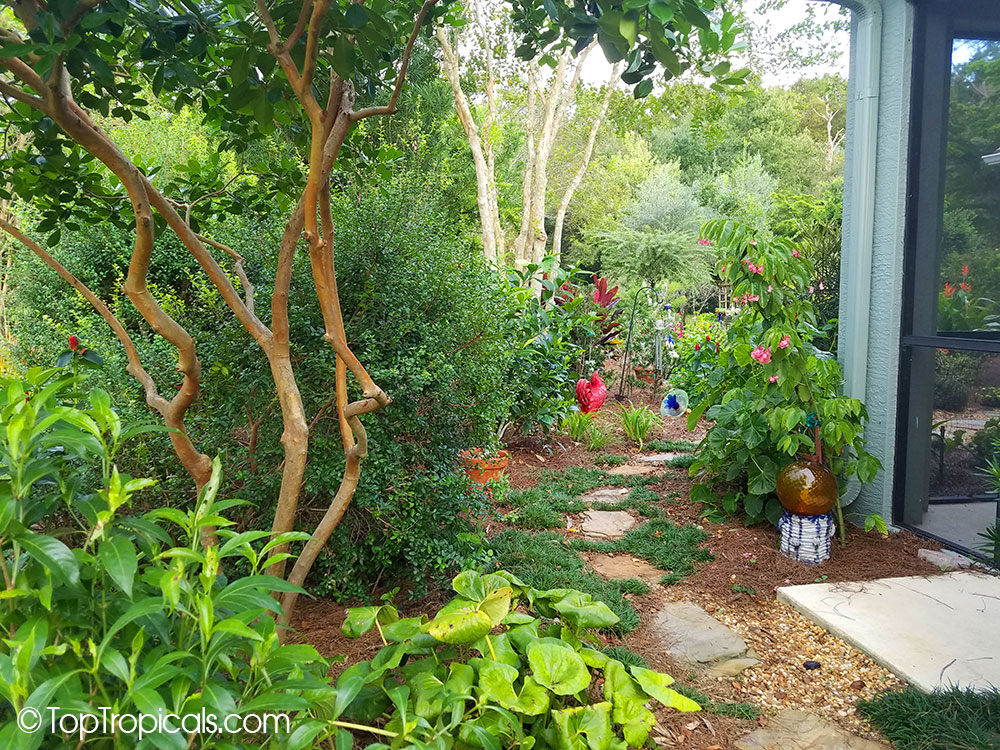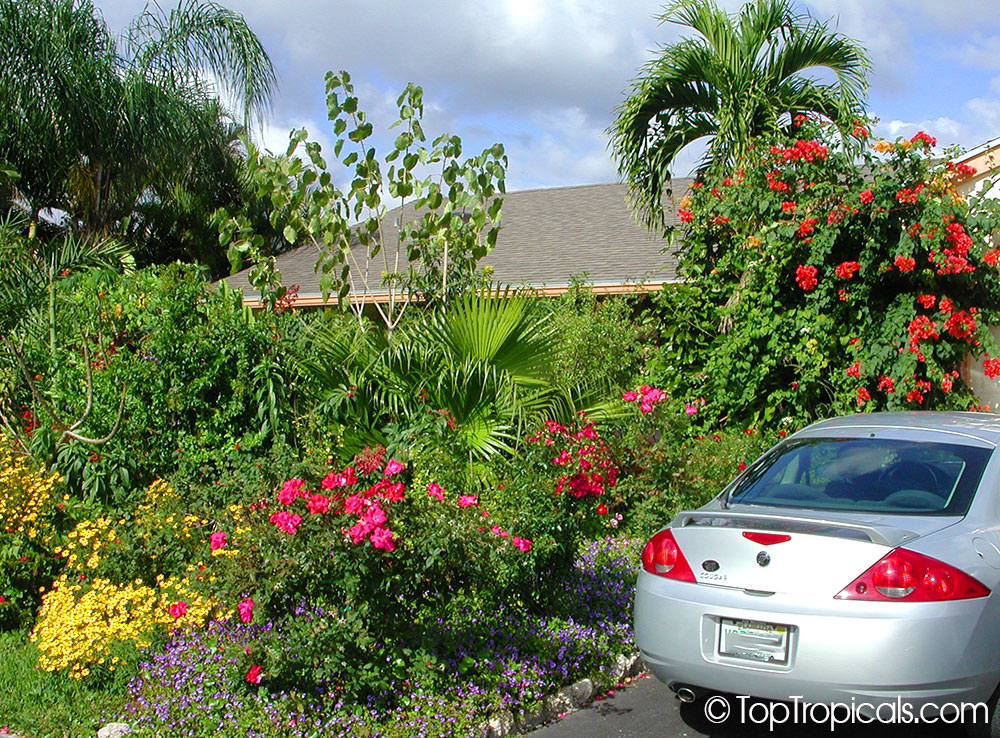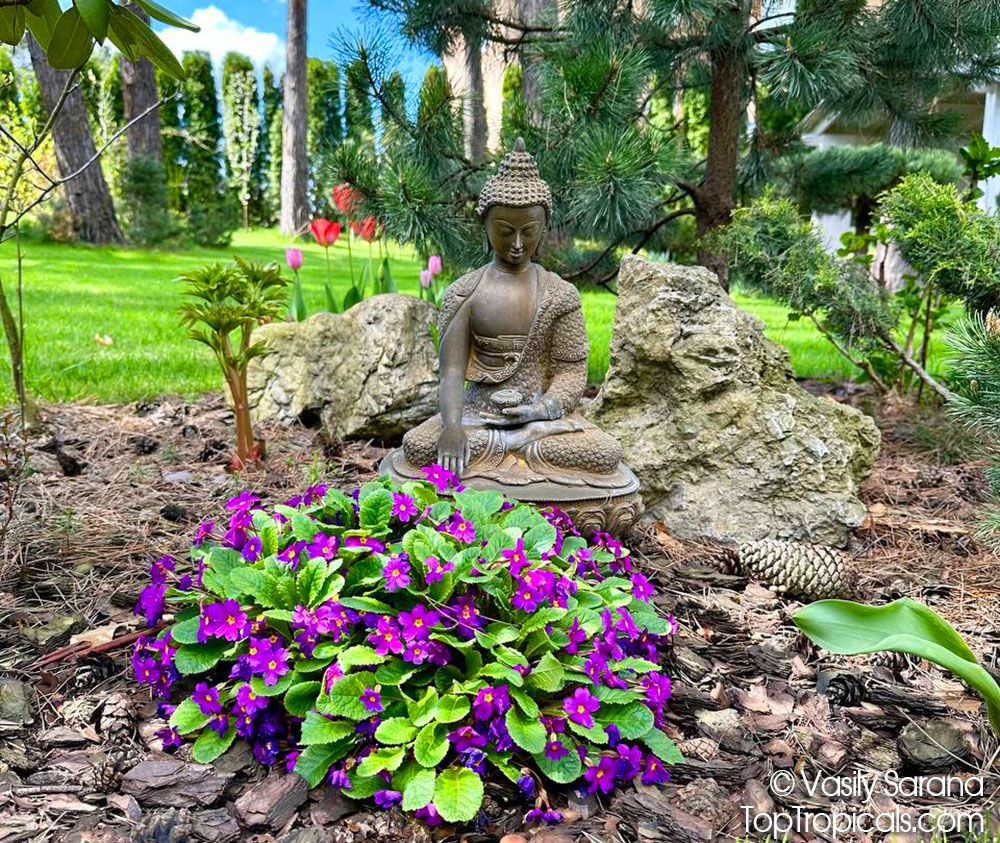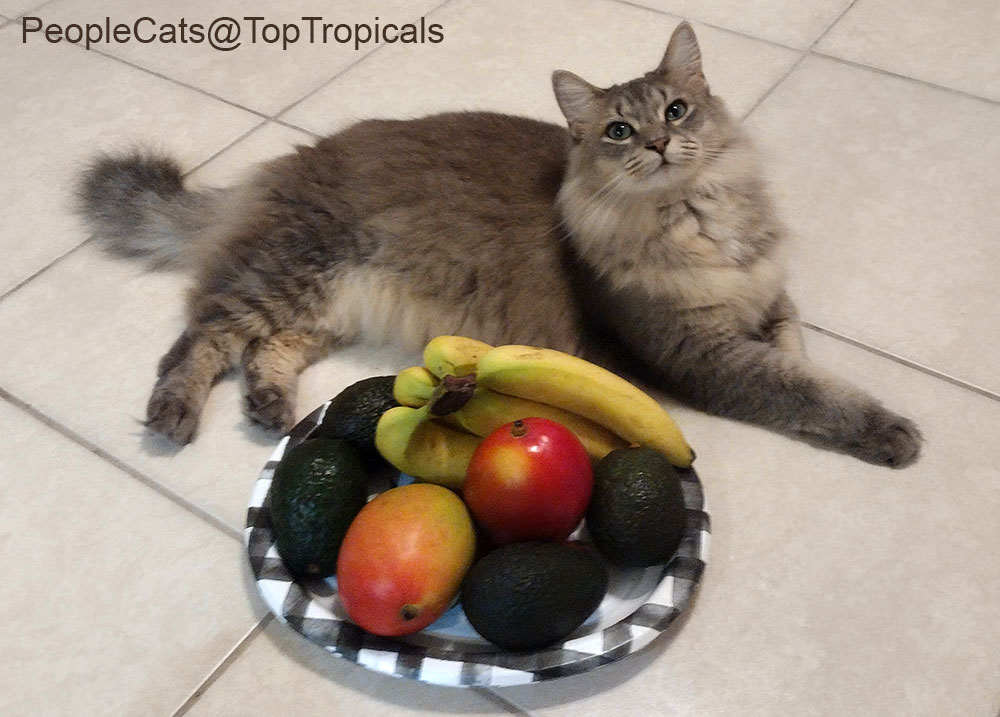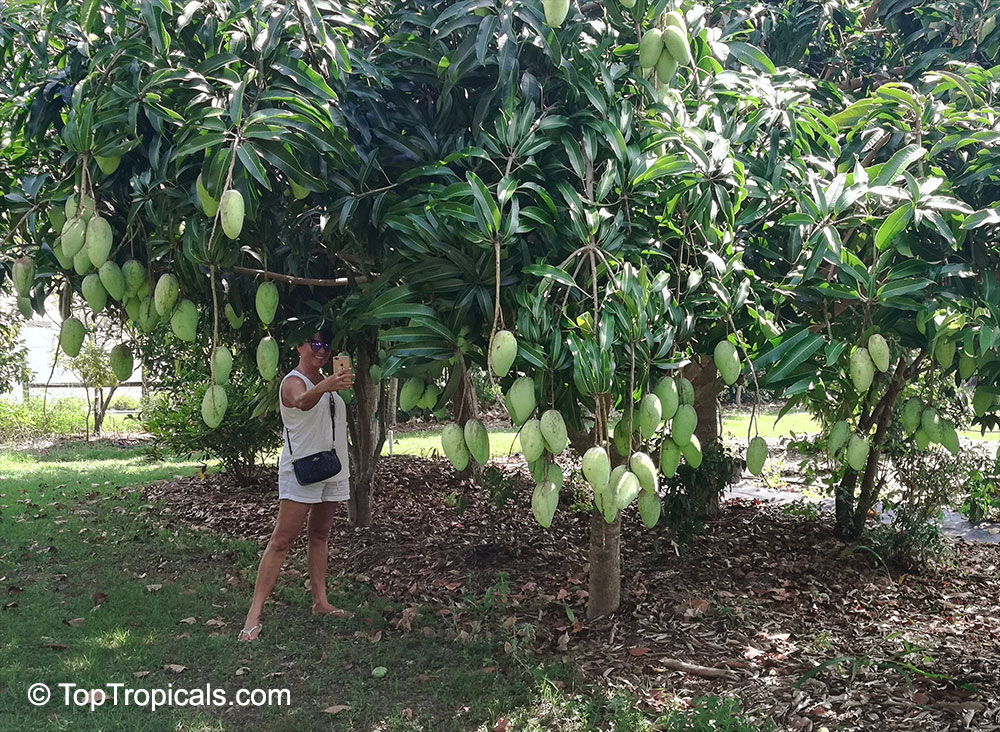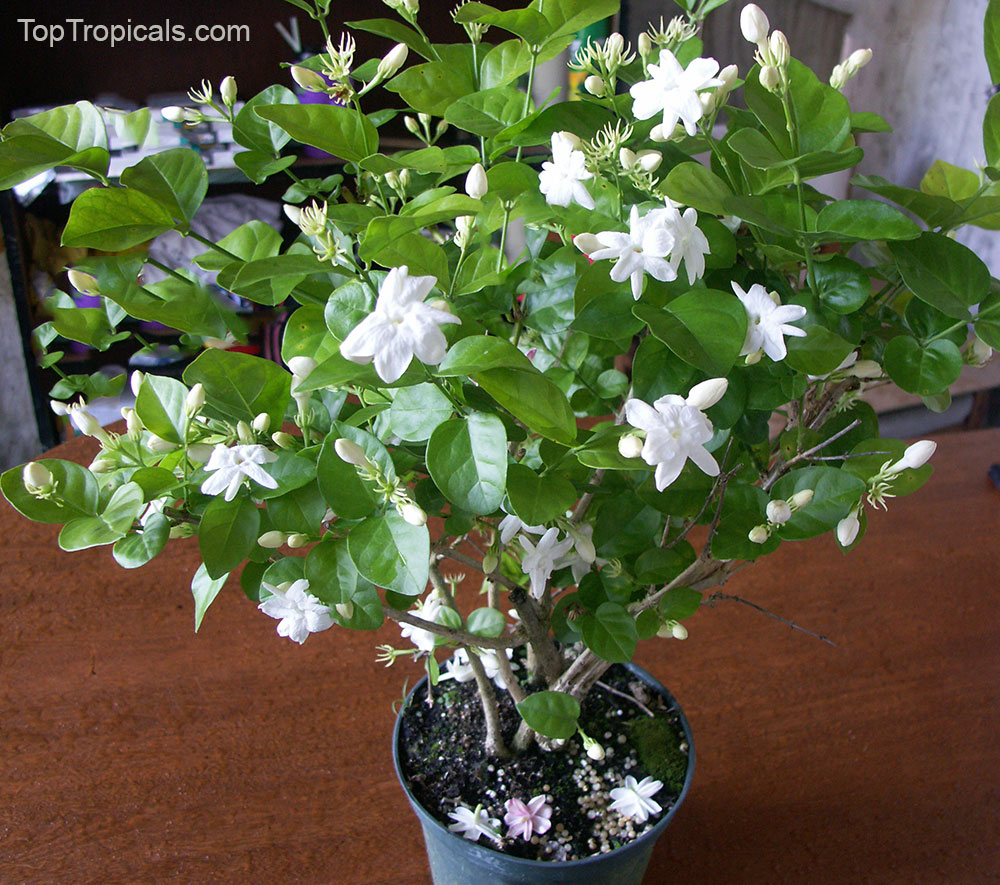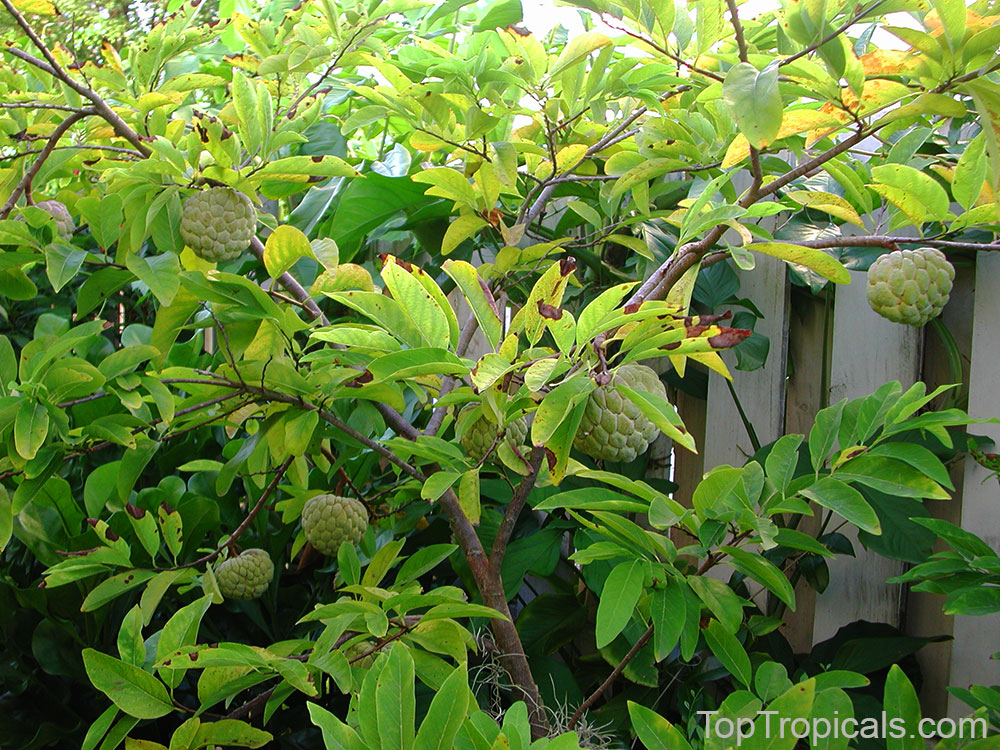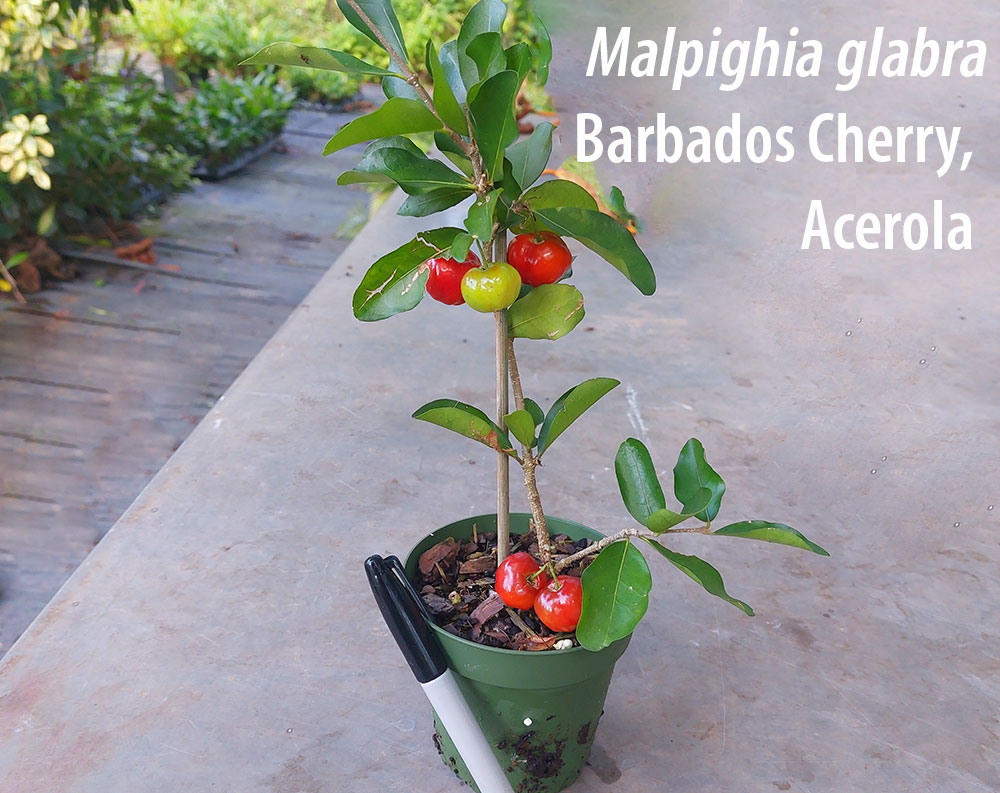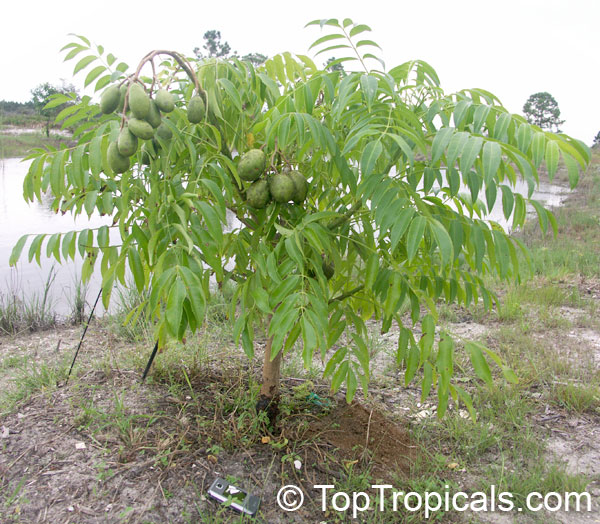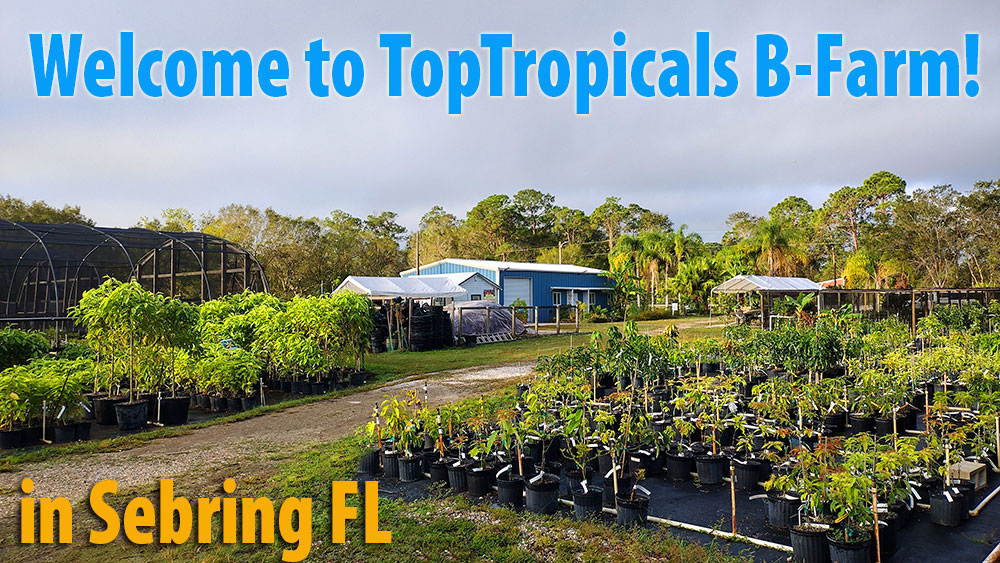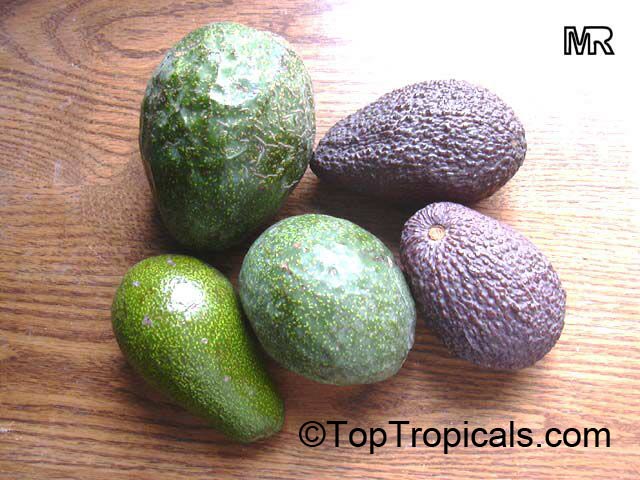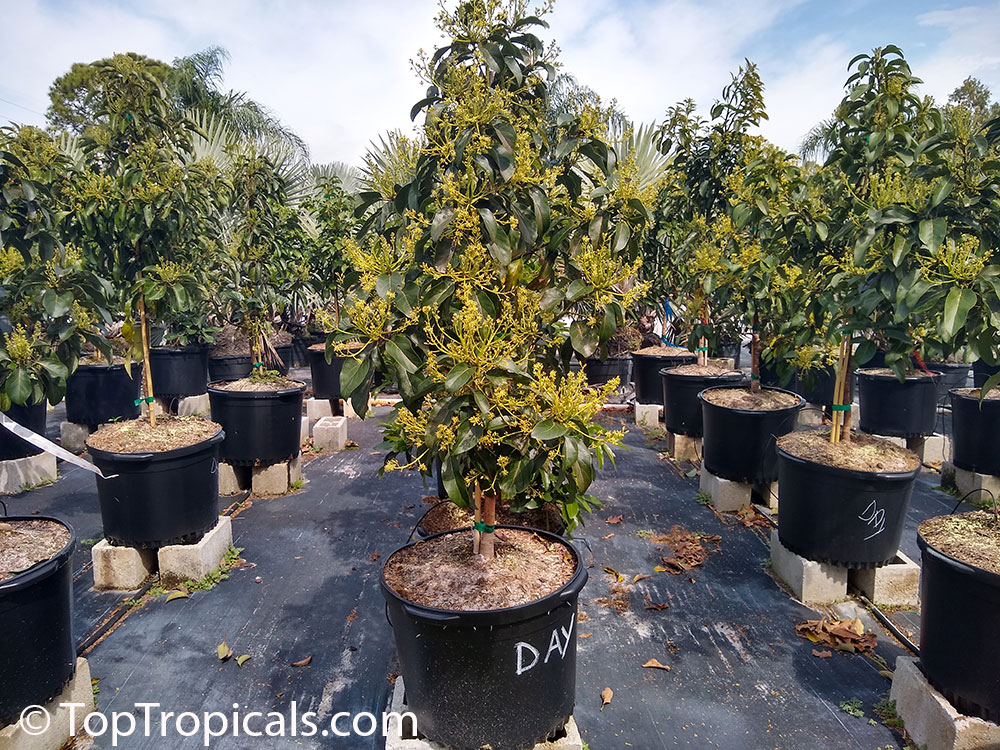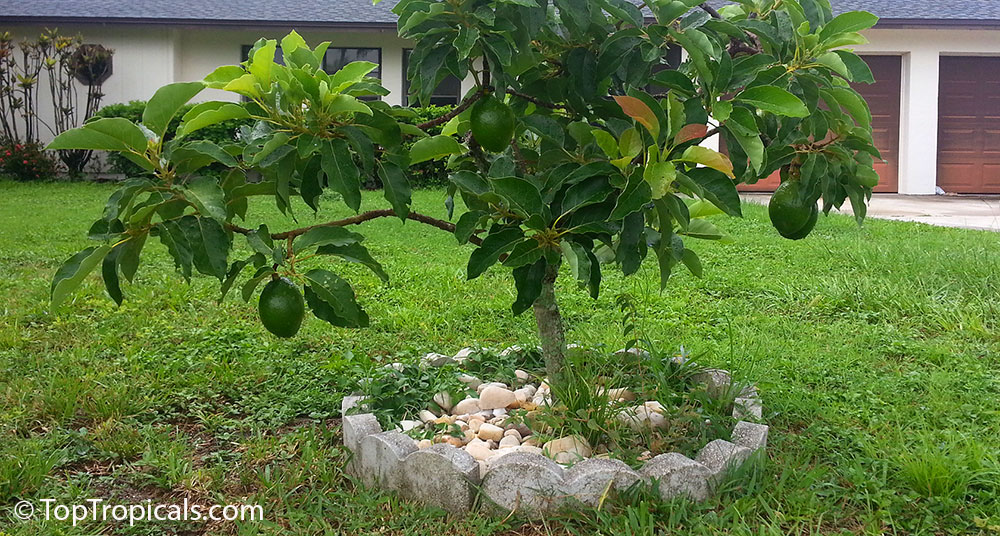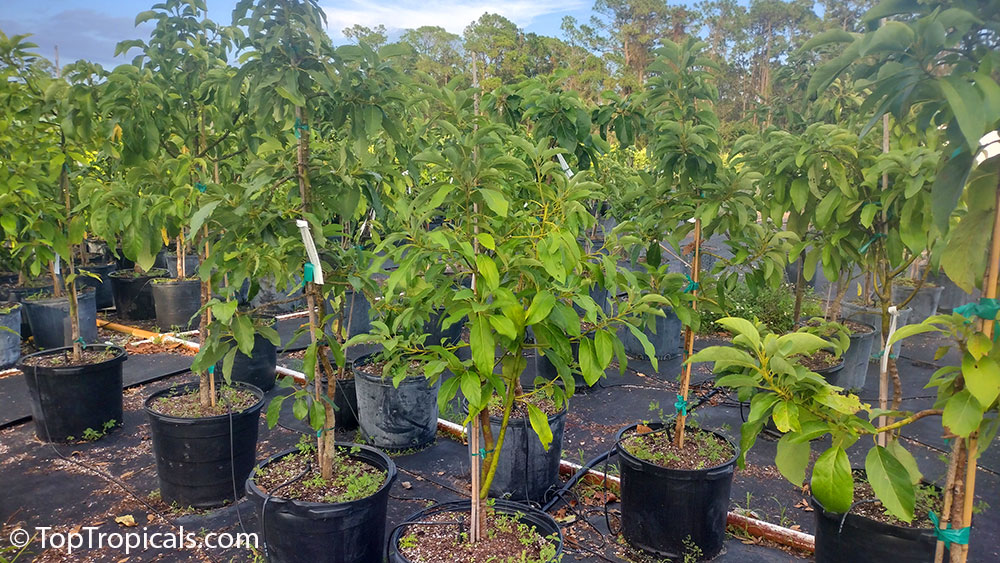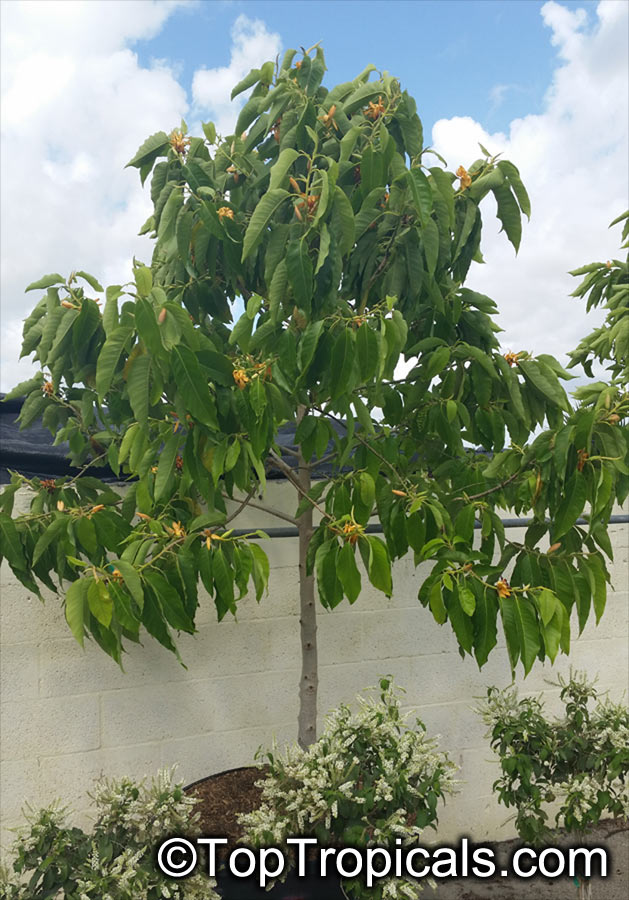Date:
Garden Blog - Top Tropicals
Date:
The Benefits of Companion Planting
Q: What is companion planting?
A: Companion planting is a gardening technique that involves planting different crops or types of plants together in a way that benefits all plants. This practice has been used for centuries, and it can be especially useful in tropical gardens where there is a diversity of plant life: trees, shrubs, vines and climbers, ground covers, fruit and edibles, and different flowering ornamentals. It is a great way to improve the health and yield of fruit tree crops while reducing the need for fertilizers and pesticides. By choosing the right companion plants and planning your garden layout carefully, you can create a vibrant and diverse ecosystem that will benefit both your plants and the environment.
Companion planting involves:
Planting different crops together to repel insects: adding such plants as Lemon grass, Patchouli leaf, or Moujean Tea near your vegetables can deter aphids and other pests.
Attracting pollinators - Butterfly plants. Many tropical crops, such as passion fruit, papaya, mango, and avocado, rely on pollinators to produce fruit. Companion planting can help to attract pollinators such as bees, butterflies, and hummingbirds to your garden.
Providing nutrients to the soil, adding mulch and low growing plants (ground covers) to preserve moisture.
Planting a variety of different types of plants together in order to create a more resilient ecosystem that is less susceptible to pests and diseases.
To get started, plan your garden layout and choose companion plants with
similar water and light requirements.
For example, plant in the same group lush foliage plants, gingers, and flowering brunfelsias in shady areas; plant jasmines and gardenias in full sun and very well-drained spots.
Rotate annual crops regularly and experiment with combinations to find what
works best. By doing this, you can create a thriving ecosystem that benefits
both your plants and the environment, reducing the need for harmful
chemicals.
Date:
Mark your calendars: March 25
Hello Spring! Plant Market
Saturday, March 25, 9 am - 4 pm
Join us for a celebration of Spring at our annual Spring Garden Festival! Immerse yourself in a world of colorful blooms, fragrant scents, and nature's beauty. Don't miss out on the opportunity to stroll through our gardens and nursery. Bring your friends and family for a day of fun in the sun!
Event agenda:
9 am - 4 pm: Plant Market. 20% OFF all plants.
Raffle.
Gift bags - for first 25 customers with $50 order
Secret Garden: Super savings area 50% off
Avocado tree special (pricing includes event discount):
$55 - 3 gal, $95 - 7 gal, $143 - 15 gal
(pick up only, quote for delivery and installation)
Event discounts and specials valid at both locations:
Ft Myers Garden Center: 13890 Orange River, Ft Myers, FL
Sebring B-Farm: 9100 McRoy Rd, Sebring, FL
Date:
Benefits of growing your own tropical fruit
"The fruit of the mango tree is no longer forbidden.
Indeed, it has been recommended to me by the physicians as an antidote to the
plague."
- Louis IX, King of France -
Q: Why do you want to grow your own tropical fruit tree?
A: Growing your own tropical fruit tree can have many benefits. Here are a few reasons why someone might choose to grow their own tropical fruit tree:
1. Fresh, flavorful fruit: When you grow your own tropical fruit tree, you have access to fresh, flavorful fruit that you may not be able to find at your local grocery store. Tropical fruit, like avocado, mangoes, papayas, and passionfruit, jackfruit, Dragon Fruit, Annona have a short shelf life, and the fruit you find at the store may have been harvested weeks ago. When you grow your own fruit tree, you can pick the fruit when it's fully ripe and enjoy it at its peak flavor. Besides, some rare fruit like Akee or Sapodilla simply never offered from the store.
2. Environmental benefits: Growing your own fruit trees can have environmental benefits. Trees absorb carbon dioxide from the air and release oxygen, which can help reduce your carbon footprint. Additionally, growing your own fruit trees reduces the need to transport fruit long distances, which can help reduce greenhouse gas emissions.
3. Cost savings: Depending on where you live and the availability of tropical fruit, growing your own fruit tree can be a cost-effective way to enjoy your favorite tropical fruits.
4. Gardening and outdoor hobby: Growing a fruit tree can be a fulfilling and rewarding outdoor hobby. It can also be a great way to teach children about where their food comes from and the importance of taking care of the environment.
Overall, growing your own tropical fruit tree can be a great way to enjoy fresh, flavorful fruit, reduce your carbon footprint, save money, and enjoy a fulfilling outdoor hobby.
In the photo: Mango tree in Top Tropicals garden.
Date:
Gift Plants
In the photo: fragrant Jasmine Sambac Maid of Orleans
How to make the best gift plant?
1. Consider her/his interests and environment: Think about the recipient's favorite colors, preferred growing conditions (e.g. sunlight, temperature), and any specific plants they already have and like.
2. Choose an easy plant, especially when giving it to inexperienced gardener. Desert roses, Plumerias, Indoor plants are great for both beginners and experts.
3. Something to enjoy right away: Select an established plant with developed roots and foliage. Grafted fruit trees will produce soon, and aroma of a spice tree can be appreciated without waiting for it to grow bigger. House plants such as Philodendrons with ornamental foliage will brighten the room.
4. Presentation matters: Wrap the plant in decorative paper or a gift bag, and consider adding a bow or tag for a personal touch.
5. Add a personal touch: Consider pairing the plant with a personalized message or a small item such as a watering can, plant food, or a pretty planter. Your thoughtfulness will make the gift even more special.
Some gift plant ideas: Jasmines - Desert Roses - Gingers - Mango - Avocado - Spice plants - Indoor plants - easy maintenance plants - Plants of Love: Aphrodisiacs.
In the photo: Annonas are one of the most popular tropical fruit trees, fast fruiting, suitable for small gardens and container culture
Date:
Date:
Eight best fruit trees that produce right away
Grow Your Own Food
In the photo: Malpighia glabra - Barbados Cherry, Acerola
What fruit trees start fruiting right away?
Q: What fruit trees do you recommend that will start fruiting right away? I am 84 and I would really love to see the fruit sooner than later!
A: Most of grafted fruit trees will start producing the same year - such as Mango, Avocado, Peaches and other grafted trees. Besides, these are several garden favorites that start fruiting right in 1-3 gal container.
1. Eriobotrya japonica - Loquat
2. Spondias cytherea - June Plum
3. Psidium guajava - Tropical Guava
4. Musa sp. - Banana
5. Annona squamosa - Sugar Apple
6. Morus sp. - Mulberry tree
7. Eugenia uniflora - Surinam Cherry
8. Malpighia glabra - Barbados Cherry, Acerola
Date:
This Friday: Green Friday...
and every Friday and Saturday!
Welcome to TopTropicals B-Farm in Sebring FL
Starting this coming Friday, November 25, our farm in Sebring (B-Farm)
will be open to the public every Friday and Saturday.
B-Farm is a 10-acre growing facility with hundreds of varieties of rare and
much wanted tropical plants. Fruit trees, flowering trees, shrubs, vines,
fragrant plants and rare collectibles - we grow the biggest selection of
tropical plants known in cultivation.
Come over to select the best Mango, Avocado, any other fruit tree or rare
spice for your edible landscape. Shop our biggest in the world variety of
flowering and fragrant tropical plants - directly from our growing farm!
Conveniently located right in the heart of Florida, Highlands County, Top Tropicals B-Farm is within about an hour from most Florida destinations.
Date:
What is the best Avocado variety?
Grow Your Own Food
Q: Most trees in my yard were destroyed by hurricane Ian and now I have to start my landscape from scratch. So I decided to plant something useful. Avocado is my favorite. In the stores I see two kinds, large green or small black, but I was told there are many varieties. When I googled the best variety of avocado I found your website. You have quite a selection! Now I don't know which variety to chose. Can you please help? I have room for several trees.
A: Indeed there are many varieties of Avocado (we grow over 50 kinds). Some avocado lovers try
to get as many varieties as they can fit in their yards because every variety
has its unique flavor and texture.
2 main Avocado kinds that we usually see in grocery stores are -
1) smaller black fruit with rich, buttery texture - Mexican and Guatemalan
hybrids
2) green avocado, some can be as large as a small melon, but they have
light texture - West Indian types
There are many hybrids. How to pick the right variety for your yard?
Check out our Avocado variety page and scroll down to see a chart that shows characteristics of fruit, tree size, cold hardiness, and chose the right variety that fits your needs.
Below are just a few picks from our horticulturist - our favorite varieties that we enjoy and highly recommend to others.
Best tasting large green Avocado hybrids:
Bernecker, Beta, Doni, Catalina, Pollock.
Best tasting black or dark green, buttery Avocado hybrids:
Winter Mexican, Brogdon, Black Prince, Day, Fantastic, Florida Hass, Marcus Pumpkin, Mexicola Grande, Nishikawa, Waldin
Dwarf trees (black fruit):
For local customers: see large 15-gal size Avocado trees, delivery and installation available!
Today all avocados are 13% off instantly with no min. order, take advantage of this quick sale and get all varieties you want!
Date:
This Fall Special:
Avocados and Champakas in large containers
The clean-up and restoration after Hurricane Ian continues for many of us across Florida and the Southeast. Some people In SW Florida lost their homes, and almost every home owner lost a tree or even the whole garden. TopTropicals is here to help. We started introducing special Re-Leaf offers to help local gardeners replace broken trees. When it's time to restore your garden, we have 15-25 gallon Avocado trees in many varieties and oversized Magnolia Champaca trees available for pick up at our Fort Myers Garden Center or B-Farm in Sebring.
These trees are 6-8 feet tall (some larger) and ready to bear fruit!
Please call or visit our Garden Center to select your own tree.
Delivery and installation available
Limited time offer!
